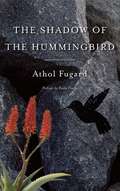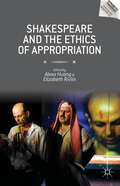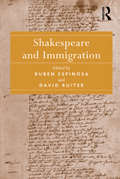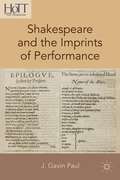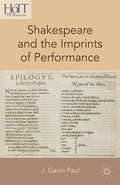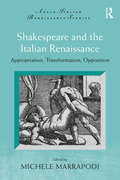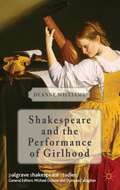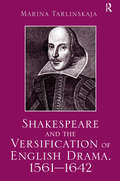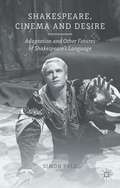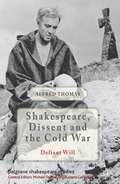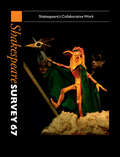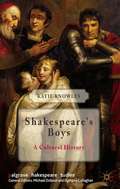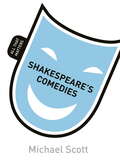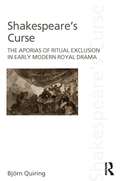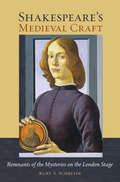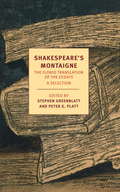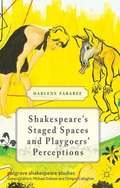- Table View
- List View
The Shadow of the Hummingbird
by Athol Fugard Paula Fourie"The greatest active playwright in the English-speaking world."--Time"If there is a more urgent and indispensable playwright in world theater than South Africa's Athol Fugard, I don't know who it could be."--Newsweek"Athol Fugard can say more with a single line than most playwrights convey in an entire script."--VarietyLegendary theatre artist Athol Fugard returns to the stage for the first time in fifteen years in this, his latest work. The Shadow of the Hummingbird tells the story of an ailing man in his eighties and the afternoon spent with his ten year-old grandson. In a charming meditation on the beauty and transience of the world around us, Fugard continues to mine the depths of the human spirit with profound empathy and heart. The text of the play includes an introductory Prelude by Paula Fourie with extracts from Fugard's unpublished notebooks.Athol Fugard has been working in the theater as a playwright, director, and actor for more than fifty years. In 2011, he received a Special Tony Award for Lifetime Achievement in the Theatre, and he was the inaugural Humanitas Visiting Professor of Drama at Oxford University. His plays include Blood Knot, Boesman and Lena, Statements After an Arrest Under the Immorality Act, Sizwe Banzi Is Dead, 'Master Harold' . . . and the Boys, The Road to Mecca, My Children! My Africa! and The Blue Iris.
Shakespeare And The Ethics Of Appropriation
by Alexa Huang Elizabeth RivlinMaking an important new contribution to rapidly expanding fields of study surrounding the adaptation and appropriation of Shakespeare, Shakespeare and the Ethics of Appropriation is the first book to address the intersection of ethics, aesthetics, authority, and authenticity.
Shakespeare and Immigration
by Ruben EspinosaShakespeare and Immigration critically examines the vital role of immigrants and aliens in Shakespeare's drama and culture. On the one hand, the essays in this collection interrogate how the massive influx of immigrants during the reign of Queen Elizabeth I influenced perceptions of English identity and gave rise to anxieties about homeland security in early modern England. On the other, they shed light on how our current concerns surrounding immigration shape our perception of the role of the alien in Shakespeare's work and expand the texts in new and relevant directions for a contemporary audience. The essays consider the immigrant experience; strangers and strangeness; values of hospitality in relationship to the foreigner; the idea of a host society; religious refuge and refugees; legal views of inclusion and exclusion; structures of xenophobia; and early modern homeland security. In doing so, this volume offers a variety of perspectives on the immigrant experience in Shakespearean drama and how the influential nature of the foreigner affects perceptions of community and identity; and, collection questions what is at stake in staging the anxieties and opportunities associated with foreigners. Ultimately, Shakespeare and Immigration offers the first sustained study of the significance of the immigrant and alien experience to our understanding of Shakespeare's work. By presenting a compilation of views that address Shakespeare's attention to the role of the foreigner, the volume constitutes a timely and relevant addition to studies of race, ethics, and identity in Shakespeare.
Shakespeare and Renaissance Ethics
by Patrick Gray John D. CoxWritten by a distinguished international team of contributors, this volume explores Shakespeare's vivid depictions of moral deliberation and individual choice in light of Renaissance debates about ethics. Examining the intellectual context of Shakespeare's plays, the essays illuminate Shakespeare's engagement with the most pressing moral questions of his time, considering the competing claims of politics, Christian ethics and classical moral philosophy, as well as new perspectives on controversial topics such as conscience, prayer, revenge and suicide. Looking at Shakespeare's responses to emerging schools of thought such as Calvinism and Epicureanism, and assessing comparisons between Shakespeare and his French contemporary Montaigne, the collection addresses questions such as: when does laughter become cruel? How does style reflect moral perspective? Does shame lead to self-awareness? This book is of great interest to scholars and students of Shakespeare studies, Renaissance studies and the history of ethics.
Shakespeare and the Digital World
by Christie Carson Peter KirwanDue to the unique cultural capital of his works, Shakespeare has long been the test subject for new methods and digital advances in arts scholarship. Shakespeare sits at the forefront of the digital humanities – in archiving, teaching, performance and editing – impacting on scholars, theatres and professional organisations alike. The pace at which new technologies have developed is unprecedented (and the pressure to keep up is only growing). This book offers seventeen new essays that assess the opportunities and pitfalls presented by the twenty-first century for the ongoing exploration of Shakespeare. Through contributions from a broad range of scholars and practitioners, including case studies from those working in the field, the collection engages with the impact of the digital revolution on Shakespeare studies. By assessing and mediating this sometimes controversial digital technology, the book is relevant to those interested in the digital humanities as well as to Shakespeare scholars and enthusiasts.
Shakespeare and the Embodied Heroine
by Lori LeighShakespeare and the Embodied Heroine is a dynamic cross-period investigation of Shakespeare's notable female characters from the late plays. Using the Restoration and eighteenth century adaptations of Shakespeare's plays, this book explores female characters from a theatrical point-of-view that includes a close-reading and imagining of the text with a 'directorial eye', performance history, and practical staging experiments. Leigh reveals evidence to question certain conventional interpretations of Shakespeare's heroines and also documents a paradoxical reduction of sexuality and independent agency for Shakespeare's female roles as they started to be played by actresses rather than boy players. Highlighting the manner in which Shakespeare's female characters have the power to question, subvert, and reposition gender boundaries, and illuminating the complexity and multiplicity of the ways the women in Shakespeare's plays express their agency and desire, this book provides fascinating new readings on the staging and reception of Shakespeare's heroines.
Shakespeare and the Imprints of Performance (History Of Text Technologies)
by J. Gavin PaulShakespeare and the Imprints of Performance.
Shakespeare and the Imprints of Performance (History of Text Technologies)
by J. Gavin PaulWithin the study of drama, the question of how to relate text and performance—and what interpretive tools are best suited to analyzing them—is a longstanding and contentious one. Most scholars agree that reading a printed play is a means of dramatic realization absolutely unlike live performance, but everything else beyond this premise is contestable: how much authority to assign to playwrights, the extent to which texts and readings determine performance, and the capability of printed plays to communicate the possibilities of performance. Without denying that printed plays distort and fragment performance practice, this book negotiates an intractable debate by shifting attention to the ways in which these inevitable distortions can nevertheless enrich a reader's awareness of a play's performance potentialities. As author J. Gavin Paul demonstrates, printed plays can be more meaningfully engaged with actual performance than is typically assumed, via specific editorial principles and strategies. Focusing on the long history of Shakespearean editing, he develops the concept of the performancescape: a textual representation of performance potential that gives relative shape and stability to what is dynamic and multifarious.
Shakespeare and the Italian Renaissance: Appropriation, Transformation, Opposition (Anglo-Italian Renaissance Studies)
by Michele MarrapodiShakespeare and the Italian Renaissance investigates the works of Shakespeare and his fellow dramatists from within the context of the European Renaissance and, more specifically, from within the context of Italian cultural, dramatic, and literary traditions, with reference to the impact and influence of classical, coeval, and contemporary culture. In contrast to previous studies, the critical perspectives pursued in this volume’s tripartite organization take into account a wider European intertextual dimension and, above all, an ideological interpretation of the 'aesthetics' or 'politics' of intertextuality. Contributors perceive the presence of the Italian world in early modern England not as a traditional treasure trove of influence and imitation, but as a potential cultural force, consonant with complex processes of appropriation, transformation, and ideological opposition through a continuous dialectical interchange of compliance and subversion.
Shakespeare and the Performance of Girlhood
by Deanne WilliamsThis is the first scholarly study devoted to Shakespeare's girl characters and conceptions of girlhood. It charts the development of Shakespeare's treatment of the girl as a dramatic and literary figure, and explores the impact of Shakespeare's girl characters on the history of early modern girls as performers, patrons, and authors.
Shakespeare and the Versification of English Drama, 1561-1642
by Marina TarlinskajaSurveying the development and varieties of blank verse in the English playhouses, this book is a natural history of iambic pentameter in English. The main aim of the book is to analyze the evolution of Renaissance dramatic poetry. Shakespeare is the central figure of the research, but his predecessors, contemporaries and followers are also important: Shakespeare, the author argues, can be fully understood and appreciated only against the background of the whole period. Tarlinskaja surveys English plays by Elizabethan, Jacobean and Caroline playwrights, from Norton and Sackville’s Gorboduc to Sirley’s The Cardinal. Her analysis takes in such topics as what poets treated as a syllable in the 16th-17th century metrical verse, the particulars of stressing in iambic pentameter texts, word boundary and syntactic segmentation of verse lines, their morphological and syntactic composition, syllabic, accentual and syntactic features of line endings, and the way Elizabethan poets learned to use verse form to enhance meaning. She uses statistics to explore the attribution of questionable Elizabethan and Jacobean plays, and to examine several still-enigmatic texts and collaborations. Among these are the poem A Lover's Complaint, the anonymous tragedy Arden of Faversham, the challenging Sir Thomas More, the later Jacobean comedy The Spanish Gypsy, as well as a number of Shakespeare’s co-authored plays. Her analysis of versification offers new ways to think about the dating of plays, attribution of anonymous texts, and how collaborators divided their task in co-authored dramas.
Shakespeare, Cinema and Desire
by Simon RyleShakespeare, Cinema and Desire explores the desires and the futures of Shakespeare's language and cinematographic adaptations of Shakespeare. Tracing ways that film offers us a rich new understanding of Shakespeare, Simon Ryle highlights issues that are central to both Shakespeare and film: media technologies, narrative territories and flows, mourning and loss, the voice, the body, sexuality and gender. The recirculation of Shakespearean ideas in the critical theory of modernity, especially figures such as Jacques Lacan, Maurice Blanchot, Jacques Derrida, and Gilles Deleuze, parallels the negotiations of film adaptation. By focusing on the dialogue between Shakespeare and modernity, this study explores how Shakespeare film adaptation raises broad questions concerning the emancipatory potential of aesthetics. Shakespeare is the source of more movie screenplays than any other writer in history, and negotiations between Shakespeare and developing cinematic technologies have been influential across the history of cinema. This book contributes a much needed analysis of the relation of Shakespeare's language to film form, providing in-depth studies of major Shakespeare adaptations from directors such as Akira Kurosawa, Peter Greenaway, Joseph Mankiewicz, Grigori Kozintsev, Svend Gade, Jean-Luc Godard, and Laurence Olivier.
Shakespeare, Dissent, and the Cold War
by Alfred ThomasShakespeare, Dissent and the Cold War is the first book to read Shakespeare's drama through the lens of Cold War politics. The book uses the Cold War experience of dissenting artists in theatre and film to highlight the coded religio-political subtexts in Hamlet, King Lear, Macbeth and The Winter's Tale.
Shakespeare in Quebec
by Jennifer DrouinIn Shakespeare in Québec, Jennifer Drouin analyses representations of nation and gender in Shakespearean adaptations written in Québec since the Quiet Revolution. Using postcolonial and gender theory, Drouin traces the evolution of discourses of nation and gender in Québec from the Conquest of New France to the present, and she elaborates a theory of adaptation specific to Shakespeare studies.Drouin's book explains why Québécois playwrights seem so obsessed with rewriting "le grand Will," what changes they make to the Shakespearean text, and how the differences between Shakespeare and the adaptations engage the nationalist, feminist, and queer concerns of Québec society.Close readings from ten plays investigate the radical changes to content that allowed Québécois playwrights to advocate for political change and contribute to the hot debates of the Quiet Revolution, the 1970 October Crisis, the 1980 and 1995 referenda, the rise of feminism, and the emergence of AIDS. Drouin reveals not only how Shakespeare has been adapted in Québec but also how Québécois adaptations have evolved in response to changes in the political climate. As a critical analysis in English of rich but largely ignored French plays, Shakespeare in Québec bridges Canada's "two solitudes."
Shakespeare Survey: Volume 67, Shakespeare's Collaborative Work
by Peter Holland Ton HoenselaarsShakespeare Survey is a yearbook of Shakespeare studies and production. Since 1948 Survey has published the best international scholarship in English and many of its essays have become classics of Shakespeare criticism. Each volume is devoted to a theme, or play, or group of plays; each also contains a section of reviews of the previous year's textual and critical studies and of major British performances. The books are illustrated with a variety of Shakespearean images and production photographs. The current editor of Survey is Peter Holland. The first eighteen volumes were edited by Allardyce Nicoll, numbers 19-33 by Kenneth Muir and numbers 34-52 by Stanley Wells. The virtues of accessible scholarship and a keen interest in performance, from Shakespeare's time to our own, have characterized the journal from the start. For the first time, numbers 1-50 are being reissued in paperback, available separately and as a set.<P> The theme for Volume 67 is 'Shakespeare's Collaborative Work'. The complete set of Survey volumes is also available online at http://www.cambridge.org/online/shakespearesurvey. This fully searchable resource enables users to browse by author, essay and volume, search by play, theme and topic, and save and bookmark their results.
The Shakespearean Archive
by Alan GaleyWhy is Shakespeare so often associated with information technologies and with the idea of archiving itself? Alan Galey explores this question through the entwined histories of Shakespearean texts and archival technologies over the past four centuries. In chapters dealing with the archive, the book, photography, sound, information, and data, Galey analyzes how Shakespeare became prototypical material for publishing experiments, and new media projects, as well as for theories of archiving and computing. Analyzing examples of the Shakespearean archive from the seventeenth century to today, he takes an original approach to Shakespeare and new media that will be of interest to scholars of the digital humanities, Shakespeare studies, archives, and media history. Rejecting the idea that current forms of computing are the result of technical forces beyond the scope of humanist inquiry, this book instead offers a critical prehistory of digitization read through the afterlives of Shakespeare's texts.
Shakespeare’s Boys
by Katie KnowlesShakespeare's Boys: A Cultural Historyis the first extensive exploration of boyhood in Shakespeare's plays. It examines a range of characters from Shakespeare's comedies, histories and tragedies in their original early modern contexts and surveys their performance histories on stage and screen from the Restoration until the present day. Focusing on the status of aristocratic boys, the transition from boyhood to manhood and methods of education, it argues that the varied and complex portrayal of boys in Shakespeare reflects the ambiguous and transitional status of boyhood in early modern England, and that the portrayal of these on-stage boys has been a crucial, and sometimes defining, factor in the performance history of Shakespeare's plays. This study embraces this idea of characters in flux, reading Shakespearean boyhood as a continuum in which each historical reincarnation depends upon and reacts against what came before, while influencing what is to come.
Shakespeare's Comedies: All That Matters (Atm Ser.)
by Mike ScottIn Shakespeare's Comedies: All That Matters, Mike Scott explores and explains the secrets that have made Shakespeare's comedies so enduring that they continue to be performed, watched and studied by millions of people every year. Professor Scott focuses in turn on he Comedy of Errors, A Midsummer Night's Dream, Twelfth Night, As You Like It and The Merchant of Venice and builds an argument based around Shakepeare's use of language to prompt the audience's imagination and thought. This original little book, and its companion volume Shakespeare's Tragedies, fills a major gap in the market for a book which will enable readers to understand a Shakesperean play in the context of its ouevre. This accessible and readable book will appeal both to students and general readers, giving a fascinating intoruduction to Shakespeare's comedies - and what matters most about them.
Shakespeare's Comedies: All That Matters (All That Matters)
by Michael ScottIn Shakespeare's Comedies: All That Matters, Mike Scott explores and explains the secrets that have made Shakespeare's comedies so enduring that they continue to be performed, watched and studied by millions of people every year. Professor Scott focuses in turn on The Comedy of Errors, A Midsummer Night's Dream, Twelfth Night, As You Like It and The Merchant of Venice and builds an argument based around Shakepeare's use of language to prompt the audience's imagination and thought. This original little book, and its companion volume Shakespeare's Tragedies, fills a major gap in the market for a book which will enable readers to understand a Shakesperean play in the context of its ouevre.This accessible and readable book will appeal both to students and general readers, giving a fascinating intoruduction to Shakespeare's comedies - and what matters most about them."'Comedy is a serious business' says Michael Scott - it is, and his splendid short book takes it very seriously as it should, but remains lively and wonderfully readable withall." Dr Drummond Bone, Master of Balliol College, Oxford"An authoritative and expert overview of the entire fields of Shakespearean Comedy and Tragedy combined with persuasive and eminently accessible close readings of particular plays. Michael Scott brings to the task and infectious enthusiasm and deep knowledge of their theatrical, literary and cultural significance and he provides a clear and compelling endorsement of their continued relevance. These books provide an exemplary introduction to the complex world of Shakespearean drama, full of insights, observations, and ideas, all of which are brought firmly to bear on the abiding question of what these plays mean for us today." John Drakakis, Professor of English at the University of Stirling"Everything is so clear - no academic jargon, for instance. With Shakespeare's Comedies, even the most critical scholars can learn something... as well as students at the start of their encounter with Shakespeare and the same for regular theatre goers. To address all three at once... has to be an accomplishment... from the Introduction to the Conclusion... to the last sentence: (the) reader will readily grasp why this series of books is called All That Matters." Professor M.L.Wine, Evanston, USA
Shakespeare's Curse: The Aporias of Ritual Exclusion in Early Modern Royal Drama
by Björn QuiringConceptualizing the curse as the representation of a foundational, mythical violence that is embedded within juridical discourse, Shakespeare’s Curse:The Aporias of Ritual Exclusion in Early Modern Royal Drama pursues a reading of Richard III, King John, and King Lear in order to analyse the persistence of imprecations in the discourses of modernity. Shakespeare wrote during a period that was transformative in the development of juridical thinking. However, taking up the relationship between theater, theology and law, Björn Quiring argues that the curse was not eliminated from legal discourses during this modernization of jurisprudence; rather, it persisted and to this day continues to haunt numerous speech acts. Drawing on the work of Derrida, Lacan, Walter Benjamin and Giorgio Agamben, among others, Quiring analyses the performativity of the curse, and tracks its power through the juristic themes that are pursued within Shakespeare’s plays – such as sovereignty, legitimacy, succession, obligation, exception, and natural law. Thus, this book provides an original and important insight into early modern legal developments, as well as a fresh perspective on some of Shakespeare’s best known works. A fascinating interdisciplinary study, this book will interest students and scholars of Law, Literature, and History.
Shakespeare’s Medieval Craft: Remnants of the Mysteries on the London Stage
by Kurt A. SchreyerIn Shakespeare's Medieval Craft, Kurt A. Schreyer explores the relationship between Shakespeare’s plays and a tradition of late medieval English biblical drama known as mystery plays. Scholars of English theater have long debated Shakespeare’s connection to the mystery play tradition, but Schreyer provides new perspective on the subject by focusing on the Chester Banns, a sixteenth-century proclamation announcing the annual performance of that city’s cycle of mystery plays. Through close study of the Banns, Schreyer demonstrates the central importance of medieval stage objects—as vital and direct agents and not merely as precursors—to the Shakespearean stage. As Schreyer shows, the Chester Banns serve as a paradigm for how Shakespeare’s theater might have reflected on and incorporated the mystery play tradition, yet distinguished itself from it. For instance, he demonstrates that certain material features of Shakespeare’s stage—including the ass’s head of A Midsummer Night’s Dream, the theatrical space of Purgatory in Hamlet, and the knocking at the gate in the Porter scene of Macbeth—were in fact remnants of the earlier mysteries transformed to meet the exigencies of the commercial London playhouses. Schreyer argues that the ongoing agency of supposedly superseded theatrical objects and practices reveal how the mystery plays shaped dramatic production long after their demise. At the same time, these medieval traditions help to reposition Shakespeare as more than a writer of plays; he was a play-wright, a dramatic artisan who forged new theatrical works by fitting poetry to the material remnants of an older dramatic tradition.
Shakespeare's Montaigne
by Peter G. Platt Stephen Greenblatt John Florio Michel De MontaigneAn NYRB Classics OriginalShakespeare, Nietzsche wrote, was Montaigne's best reader--a typically brilliant Nietzschean insight, capturing the intimate relationship between Montaigne's ever-changing record of the self and Shakespeare's kaleidoscopic register of human character. And there is no doubt that Shakespeare read Montaigne--though how extensively remains a matter of debate--and that the translation he read him in was that of John Florio, a fascinating polymath, man-about-town, and dazzlingly inventive writer himself.Florio's Montaigne is in fact one of the masterpieces of English prose, with a stylistic range and felicity and passages of deep lingering music that make it comparable to Sir Robert Burton's Anatomy of Melancholy and the works of Sir Thomas Browne. This new edition of this seminal work, edited by Stephen Greenblatt and Peter G. Platt, features an adroitly modernized text, an essay in which Greenblatt discusses both the resemblances and real tensions between Montaigne's and Shakespeare's visions of the world, and Platt's introduction to the life and times of the extraordinary Florio. Altogether, this book provides a remarkable new experience of not just two but three great writers who ushered in the modern world.
Shakespeare's Possible Worlds
by Simon PalfreyNew methods are needed to do justice to Shakespeare. His work exceeds conventional models, past and present, for understanding playworlds. In this book, Simon Palfrey goes right to the heart of early modern popular drama, revealing both how it works and why it matters. Unlike his contemporaries, Shakespeare gives independent life to all his instruments, and to every fraction and fragment of the plays. Palfrey terms these particles 'formactions' - theatre-specific forms that move with their own action and passion. Palfrey's book is critically daring in both substance and format. Its unique mix of imaginative gusto, thought experiments, and virtuosic technique generates piercing close readings of the plays. There is far more to playlife than meets the eye. Influenced by Leibniz's visionary original model of possible worlds, Palfrey opens up the multiple worlds of Shakespeare's language, scenes, and characters as never before.
Shakespeare's Stage Traffic
by Janet ClareShakespeare's unique status has made critics reluctant to acknowledge the extent to which some of his plays are the outcome of adaptation. In Shakespeare's Stage Traffic Janet Clare re-situates Shakespeare's dramaturgy within the flourishing and competitive theatrical trade of the late sixteenth and early seventeenth centuries. She demonstrates how Shakespeare worked with materials which had already entered the dramatic tradition, and how, in the spirit of Renaissance theory, he moulded and converted them to his own use. The book challenges the critical stance that views the Shakespeare canon as essentially self-contained, moves beyond the limitations of generic studies and argues for a more conjoined critical study of early modern plays. Each chapter focuses on specific plays and examines the networks of influence, exchange and competition which characterised stage traffic between playwrights, including Marlowe, Jonson and Fletcher. Overall, the book addresses multiple perspectives relating to authorship and text, performance and reception.
Shakespeare’s Staged Spaces and Playgoers’ Perceptions
by Darlene FarabeeThis engaging study offers fresh readings of canonical Shakespeare plays, illuminating ways stagecraft and language of movement create meaning for playgoers. The discussions engage materials from the period, present revelatory readings of Shakespeare's language, and demonstrate how these continually popular texts engage all of us in making meaning.
